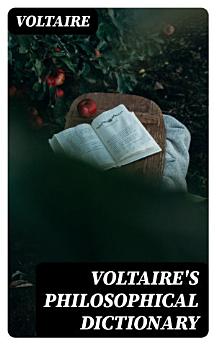Voltaire's Philosophical Dictionary
set. del 2022 · DigiCat
Llibre electrònic
284
Pàgines
family_home
Apte
info
reportNo es verifiquen les puntuacions ni les ressenyes Més informació
Sobre aquest llibre
In "Voltaire's Philosophical Dictionary," the esteemed Enlightenment thinker critiques and examines a range of philosophical topics, from religion and morality to science and government. Employing a distinct literary style characterized by wit, irony, and eloquent prose, Voltaire's work serves as both a compendium of Enlightenment thought and a caustic commentary on societal norms. Each entry is infused with his trademark skepticism, encouraging readers to question established doctrines and consider alternative perspectives, ensuring that the text resonates within the broader context of 18th-century intellectual discourse. Voltaire, born François-Marie Arouet, was a prolific writer, historian, and philosopher whose life experiences—marked by censorship, exile, and advocacy for civil liberties—shaped his critical perspective. His encounters with religious dogma and abuses of power fueled his desire to promote reason and tolerance. "Philosophical Dictionary" reflects his commitment to intellectual freedom and the examination of life's profound questions, reinforcing the values of the Age of Enlightenment and underscoring the importance of critical inquiry. This book is an essential read for anyone seeking to engage deeply with the philosophical questions that define humanity. Voltaire's sharp insights and articulate arguments invite readers to reflect on their own beliefs and the world around them, making it a timeless resource for philosophy enthusiasts and students alike.
Sobre l'autor
François-Marie Arouet, known by his nom de plume Voltaire, was a towering figure of the French Enlightenment, whose contributions to literature, philosophy, and history remain a timeless legacy. Born on November 21, 1694, in Paris, France, Voltaire established himself as a writer and a wit, unafraid to skewer the establishment and advocate for civil liberties and separation of church and state. Voltaire's oeuvre is expansive, encompassing plays, poems, novels, essays, and historical and scientific works, that challenge conventions and inspire critical thinking. Among his most notable work is 'Voltaire's Philosophical Dictionary' (1764), a seminal encyclopedic work, comprised of a series of essays that form a broad critique of traditional religion and the injustices of the time. The 'Philosophical Dictionary' is both a compendium of Enlightenment thought and an embodiment of Voltaire's literary style—marked by acerbic wit, irony, and clarity of reason. Throughout his career, Voltaire used his sharp pen to advocate for reason, progress, and freedom of expression, leaving an indelible mark on the world of letters. His influence extended beyond the pages, impacting social and political thought. Voltaire passed away on May 30, 1778, but his writings continue to engage scholars and readers alike in the fundamental questions of liberty, justice, and human happiness.
Puntua aquest llibre electrònic
Dona'ns la teva opinió.
Informació de lectura
Telèfons intel·ligents i tauletes
Instal·la l'aplicació Google Play Llibres per a Android i per a iPad i iPhone. Aquesta aplicació se sincronitza automàticament amb el compte i et permet llegir llibres en línia o sense connexió a qualsevol lloc.
Ordinadors portàtils i ordinadors de taula
Pots escoltar els audiollibres que has comprat a Google Play amb el navegador web de l'ordinador.
Lectors de llibres electrònics i altres dispositius
Per llegir en dispositius de tinta electrònica, com ara lectors de llibres electrònics Kobo, hauràs de baixar un fitxer i transferir-lo al dispositiu. Segueix les instruccions detallades del Centre d'ajuda per transferir els fitxers a lectors de llibres electrònics compatibles.








